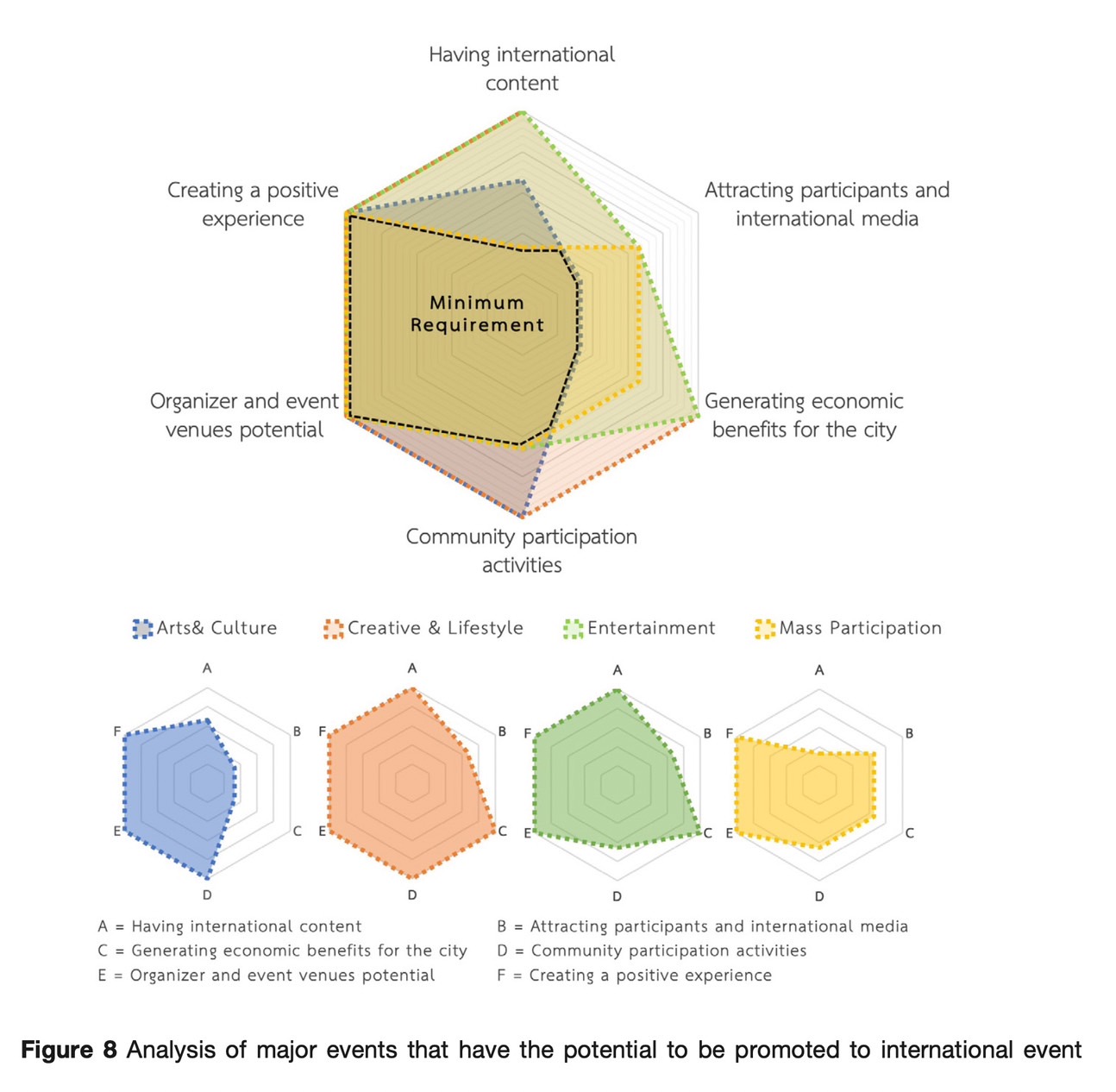Major Event-led Strategy for Urban Development and Revitalization
Main Article Content
Abstract
Organizing major events is one of the key driving mechanisms for increasing the competitiveness of destination cities, especially for the event host city. In addition to major events, community festivals and local celebrations also play an important role in increasing opportunities for creating lasting heritage because they reflect the unique city culture and their preservation of historical traditions become a cultural property. The readiness of the city also helps support a major event format that is appropriate for the context of the city and its identity. This study examined the readiness of a city through the lens of 6 key factors, i.e., geography, history, culture, tourist attractions or event venues, facilities, and transportation system of the city. In addition, the study assessed event potential for a city using criteria that included: having international content; potential to attract a large number of participants and international media; potential to generate economic benefits for the city; community participation activities; potential of the organizer and the event area; and ability to create a positive event experience. The proposals for the major events are divided into 2 types: local events that have potential to be upgraded to major events; and international major events that can be engaged to organize in the area according to the types of event: sports events, entertainment events, creative and lifestyle events, and art and cultural events. The result of the study revealed the criteria for assessing potential areas for hosting major events within the context of the city characteristics and capabilities. In addition, the contribution of this study provides guidance to a city that would like to be the host of a major event and organize the event, using the city’s assets.
Downloads
Article Details

This work is licensed under a Creative Commons Attribution-NonCommercial-NoDerivatives 4.0 International License.
All material is licensed under the terms of the Creative Commons Attribution 4.0 International (CC-BY-NC-ND 4.0) License, unless otherwise stated. As such, authors are free to share, copy, and redistribute the material in any medium or format. The authors must give appropriate credit, provide a link to the license, and indicate if changes were made. The authors may do so in any reasonable manner, but not in any way that suggests the licensor endorses you or your use. The authors may not use the material for commercial purposes. If the authors remix, transform, or build upon the material, they may not distribute the modified material, unless permission is obtained from JARS. Final, accepted versions of the paper may be posted on third party repositories, provided appropriate acknowledgement to the original source is clearly noted.
References
Allied Market Research. (2020). Asia events industry 2019-2026.
Antyufeev, A. V., Ptichnikova, G. A., & Antyufeeva, O. A. (2018). City and mega event: Transformation of urban structure. IOP Conf. Series: Materials Science and Engineering, 451(1), 1-9.
Australia Council for the Arts. (2015) Venice Biennale: History and impact. https://www.australiacouncil.gov.au/workspace/uploads/files/venice-biennale-history-and-im-59b08f2396dab.pdf
Azarm, Z., & Ranjbar, R. (2019). Investigating the nature of urban space transformation in historic cities of Iran (Case Study: Isfahan). Bagh-E Nazar, 16(73), 31-44.
Evans, G. (2019). Design of contemporary mega-events. In A. Massey (Ed.), A companion to contemporary design since 1945 (pp. 189-214). John Wiley & Sons.
He, B., Zhu, L., Cai, X., Li, J., & Zhu, H. (2020). Examining the impacts of mega-events on urban development using coupling analysis: A case study of the Boao Forum for Asia. Sustainability, 12(2): 730.
International Association of Event Hosts. (2017). Guidance for measuring benefits. https://www.eventhosts.org/resources/event-impact-standards/guidance-for-measuring-benefits-2/#KPI
Jago, L., Dwyer, L., Lipman, G., Lill, D.V., & Vorster, S. (2010). (October 2010). Optimising the potential of mega-events: An overview. International Journal of Event and Festival Management, 1(3), 220-237.
Kruger, E. A. (2011). A stakeholder perspective on mega-events as an element of tourism destination competitiveness. University of Pretoria.
Ministry of Tourism and Sports (Thailand). (2019). Tourism economic review.
OECD. (2017). OECD Tourism Paper 2017/02: Major events as catalysts for tourism. https://www.oecd-ilibrary.org/docserver/a0e8a96f-en.pdf?expires=1680616521&id=id&accname=guest&checksum=372E80F19ECBC3B89DC1E484C4533BF5
OECD. (2021). Implementing the OECD recommendation on global events and local development. https://www.oecd.org/regional/global-events-recommendation.htm
Pulse Active. (2020). Manulife DaNang International Marathon. Run Danang. https://www.rundanang.com/en/general-info/
Redland City Council. (2016). Redland City events strategy and action plan 2017–2022. Redland. https://www.redland.qld.gov.au/info/20144/strategy_planning_and_policy/807/redland_city_events_strategy_and_action_plan_2017-2022
Riza, M. (2015). Culture and city branding: Mega-events and Iconic buildings as fragile means to brand the city. Open Journal of Social Sciences, 3(7), 269-274.
Thailand Convention & Exhibition Bureau (TCEB). (2021). International homegrown support program 2021: Thailand event line up.
The World Bank Group. (2020). Urban development. https://www.worldbank.org/en/topic/urbandevelopment/overview#
Welsh Assembly Government. (2010). Event Wales: A major events strategy for Wales 2010 – 2020.
World Tourism Organization (UNWTO). (2018). UNWTO/WTCF City tourism performance research. UNWTO Publications.
World Tourism Organization (UNWTO). (2018). Urban tourism. https://www.unwto.org/urban-tourism
World Travel & Tourism Council (WTTC). (2019). Travel & tourism economic impact 2019.


